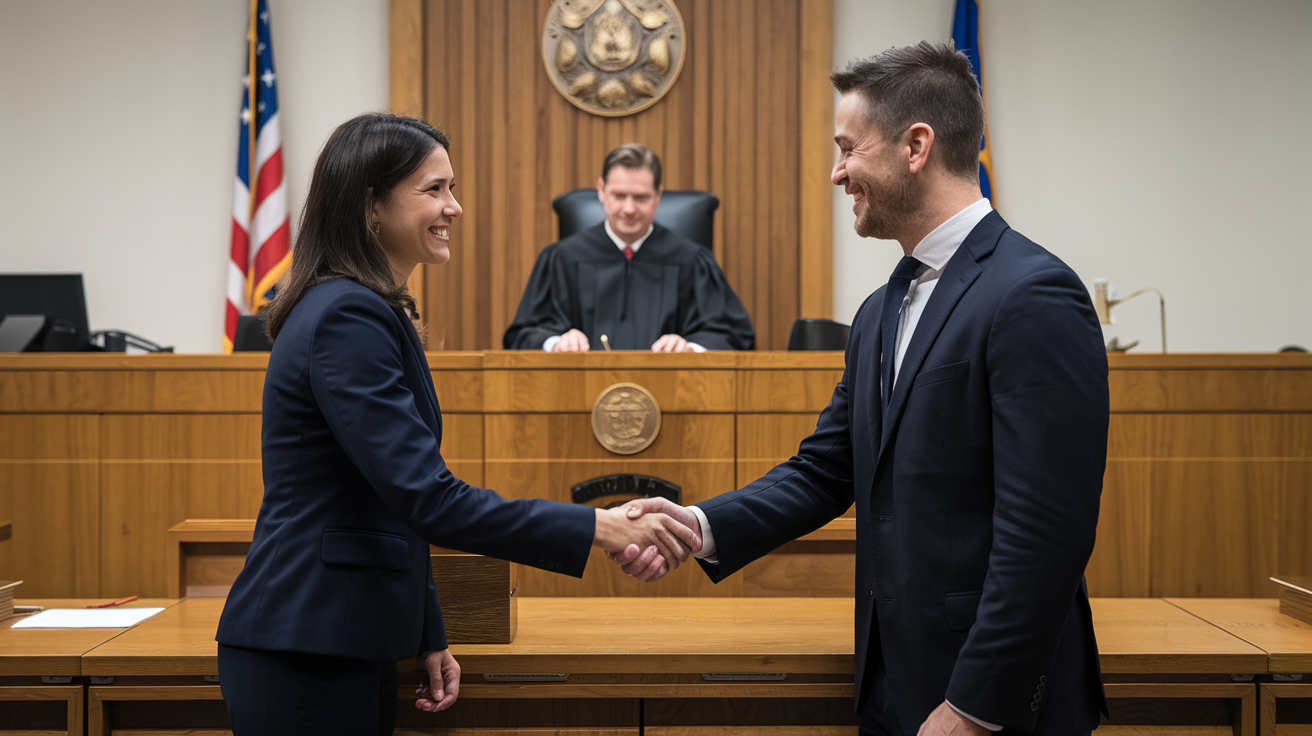Getting divorced in Florida brings up many questions.
You might feel lost in the maze of paperwork and legal terms. But here’s some good news – filing for divorce without a lawyer is possible in Florida.
Many couples choose this path when their case is simple, and both parties agree on major decisions. The process takes time to learn, but with proper guidance, you can handle the paperwork yourself.
Let’s walk through everything you need to know about filing for divorce in Florida without hiring an attorney.
Requirements for Filing for a Divorce with No Attorney
Taking control of your divorce filing in Florida starts with knowing if you meet the basic requirements. The state has clear rules about who can file without legal help.
Before starting the process, let’s look at what you need ready.
| Requirement | Details |
|---|---|
| Florida Residency | Must have lived in Florida for at least 6 months; provide proof like a driver’s license or voter card. |
| Agreement on Marriage Status | Both parties must agree the marriage is irretrievably broken. |
| Form Completion Skills | Ability to find, understand, and fill out required court forms correctly. |
| Financial Knowledge | Must understand and accurately report assets, debts, income, and expenses. |
| Property Agreement | Both parties should agree on dividing property and assets. |
| Parenting Plan | If children are involved, provide a detailed custody and visitation plan. |
| Court Communication | Comfortable dealing with court staff, following instructions, and meeting deadlines. |
| Legal Understanding | Basic understanding of Florida divorce laws and procedures. |
| Hearing Attendance | Ability to attend court appearances and present your case clearly. |
| Financial Documentation | Skills to prepare financial affidavits and gather supporting documents. |
Basic Steps to File for Divorce Without an Attorney

Now that the basic requirements have been mentioned, let’s walk through the actual filing process.
Let’s break down each part of the process into clear, manageable tasks.
Step 1 – Gather Your Documents
Before diving into the paperwork, get your documents together. This is one of the most important steps, as you must provide accurate financial information and personal records.
Here’s a list of documents to gather:
- Marriage Certificate: This proves your marriage took place and provides the court with the necessary details.
- Tax Returns from the Last Three Years: These show your financial situation.
- Recent Pay Stubs: Helps provide proof of income.
- Bank Statements: These show joint and individual financial accounts.
- Property Deeds: Include deeds for any properties owned.
- Car Titles: If you or your spouse own cars include the titles.
- Insurance Policies: Health, life, and auto insurance policies are needed for full disclosure.
Florida law requires full transparency in the financial aspects of a divorce, so make sure you have everything ready to go.
Step 2 – Get the Right Forms
Now that you have all your documents, it’s time to gather the necessary forms. You can either go to your local courthouse or download the required forms from the Florida Courts website.
Here are the important forms you’ll need to fill out:
- Petition for Divorce (Form 12.901): This is the initial form to request the dissolution of your marriage.
- Financial Affidavit (Form 12.902): You must list your assets, liabilities, income, and expenses. This helps the court determine how to divide the marital property and handle any financial support.
Make sure you print all forms on white paper with black ink, as this is the proper formatting according to Florida law.
Step 3 – Complete the Paperwork
It’s time to get down to business and fill out the forms. This part requires your full attention, so take your time. Here’s what to do:
- Read Each Form Carefully: Pay close attention to each section to avoid errors.
- Fill Out All Sections: Don’t leave anything blank, as this can delay the process. If a section doesn’t apply to your situation, write “N/A” (Not Applicable).
- Make Two Copies: One for your records and one for the court.
- Notarize Forms Where Required: Some forms need to be notarized to make sure they are valid.
Florida law emphasizes accuracy and thoroughness in the paperwork to avoid delays. Any missing or incorrect information could result in complications later.
Step 4 – File Your Papers
Once your forms are filled out, it’s time to file them with the court. Here’s what you will need to do:
- Take the Forms to Your County Courthouse: Visit the courthouse in the county where you or your spouse resides. You can also file online through Florida’s e-filing portal.
- Pay the Filing Fee: The typical filing fee is around $400. Keep in mind that fees can vary slightly by county.
- Ask About Fee Waivers if Needed: If you are experiencing financial hardship, you may be eligible for a fee waiver.
- Keep Your Case Number Safe: After filing, you will receive a case number. Keep it safe—this will help track your case as it progresses.
Filing fees are governed by Florida Statutes, and waivers are available for those who meet specific criteria under Florida Family Law.
Step 5 – Serve Your Spouse
Next, you must officially notify your spouse about the divorce proceedings. Here’s how you do it:
- Choose a Certified Process Server or Sheriff: They will serve the divorce papers to your spouse on your behalf.
- Pay the Service Fee: There’s a fee for this service, typically ranging from $20–$100, depending on who you hire.
- Keep Proof of Service: Make sure you get a certificate of service that proves your spouse received the papers.
- Wait for the Response Deadline: Your spouse has 20 days to respond to the divorce petition. If they don’t respond within that time, the court may proceed with a default judgment.
Step 6 – Attend Required Classes
If you have children, you must take a Parent Education and Family Stabilization Course.
This course is designed to help parents find out the changes that divorce brings, especially when it comes to co-parenting. Here’s how to handle this:
- Take the Course: Florida law requires both parents to attend this course if they have children under 18.
- Get Your Certificate of Completion: After finishing the course, you will receive a certificate.
- File the Certificate with the Court: Submit the certificate as proof that you have completed the requirement.
This course is part of Florida’s effort to minimize the emotional impact on children involved in a divorce and to promote cooperative co-parenting.
Step 7 – Schedule Final Hearing
The last step is scheduling the final hearing to finalize your divorce. Here’s how to get ready:
- Request a Hearing Date: Contact the clerk’s office to schedule a hearing for your divorce finalization. The clerk will give you the available dates.
- Prepare Your Settlement Agreement: If you’ve agreed on the division of assets, debts, and child custody, make sure all of this is documented in a Marital Settlement Agreement.
- Bring All Required Documents: Make sure you have all the forms, proof of service, your financial affidavit, and the certificate of completion for any courses you attended.
- Arrive Early to Court: On the day of the hearing, be sure to arrive early, as the court may be running on a tight schedule.
Once the court approves the final judgment, your divorce will be finalized under Florida Family Law.
Budget Comparison for With & Without Attorney Cases
| Cost Category | With Attorney | Without Attorney |
|---|---|---|
| Initial Filing Fees | $400–$500 | $400–$500 |
| Service of Process Fees | $100–$300 | $20–$100 |
| Document Preparation | $500–$1,500 | $0–$200 |
| Court Fees | $100–$300 | $0–$300 (varies) |
| Mediation Costs | $1,500–$4,000 | $0–$1,000 |
| Parent Education Classes | $0 (if attorney pays) | $20–$50 (per course) |
| Consultation Fees | $150–$350 per hour | $0–$0 |
| Additional Paperwork Fees | $50–$200 | $0–$50 |
| Time Investment (in hours) | 15–40 hours | 5–20 hours |
| Average Total Cost Range | $2,500–$10,000 | $500–$2,500 |
When Should You Hire an Attorney for Your Divorce

While saving money through self-filing sounds appealing, some situations need professional help. Let’s build on our cost comparison and consider when legal support becomes important.
Think carefully about getting a lawyer when your spouse has one. Going solo against legal expertise puts you at a disadvantage.
Here are some tips you should consider before going solo:
- Your marriage involves shared businesses or professional practices that need proper valuation.
- You own multiple properties or have complex retirement and investment accounts to split.
- Your spouse has already hired a lawyer or threatens to take everything to court.
- Children are involved, and you can’t agree on custody, support, or visitation schedule.
- You suspect your spouse is hiding money or assets from you.
- Your case involves domestic violence or restraining orders.
- You’re part of a military family with special pension and benefit considerations.
- Your spouse refuses to negotiate or communicate about settlement terms.
- You need help understanding complex legal documents or court procedures.
- You worry about protecting your long-term financial interests.

Conclusion
Filing for divorce without legal help requires careful attention to detail and patience.
However, you might save money by not hiring a lawyer, but you’ll need to put in extra time to learn the process.
So always remember, even without a lawyer, you’re not alone. Court clerks can explain procedures, and self-help centers can offer guidance.
In such cases, just take your time and follow directions carefully, and you’ll soon complete your divorce filing within no time.
Frequently Asked Questions
How to Get a Divorce in Florida for Free?
You can apply for a fee waiver if you meet financial hardship requirements. Use online forms to file without attorney fees.
How Do I Get a Divorce in Florida With No Money?
Request a fee waiver if you’re financially eligible. You can file independently to avoid attorney costs and use online divorce services.
What is The Quickest Way to Get a Divorce in Florida?
An uncontested divorce is the quickest, requiring both parties to agree on terms. Filing online speeds up the process.








